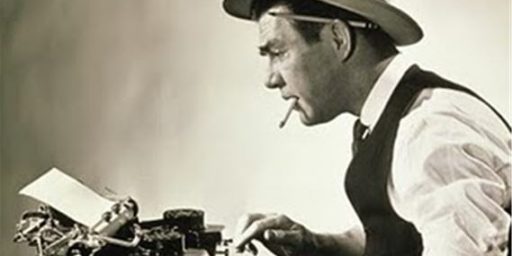NYT ROUNDUP
Not surprisingly, there is a bevy of columns on the yesterday’s resignation of Howell Raines. RealClear Politics links several of them.
John Leo thinks it demonstrates the “democratization of the media” that has been wrought by talk radio and weblogs which rapidly expose the shannanigans powerful media outlets once got away with.
Then talk radio arose, followed by tiny and brave Times-baiting print media and, finally, Internet critics who made an enormous difference. On their Web sites, Andrew Sullivan, Mickey Kaus and Glenn Reynolds pounded away relentlessly at the errors and biased coverage The Times was serving up. They were specific, smart and quick. Their audiences were not large, but a lot of other media people read them closely, and their criticisms of The Times took hold.
John Podhoretz thinks it’s even deeper than that:
The problem with the Times is that it’s become a left-wing sheet. And a cowardly one at that. It has been hiding its increasingly arrogant agenda behind its century-old reputation as the Newspaper of Record.
The chief disgrace of the tenure of Howell Raines and of his boss, publisher Arthur Sulzberger Jr., is that they have tried to lay claim to objectivity even as they have consciously attempted to manipulate public opinion. Their paper has time and again spun its own poll data in shocking ways to distort results – and only people who went and studied the numbers closely on the Times’ Web site could discern the truth. ***
I’ve worked for two newspapers – this one and the Washington Times. One of the primary qualities that has distinguished these two papers from most others in the country is that they do not pretend to be something they’re not. They are run by conservatives. Readers know it, and are given the opportunity to read them and judge for themselves whether the information in them is improperly colored by the ideological views of the owners and managers.
Collin Levey agrees with Leo on the powerful role of webloggers in this, calling it a “victory for the little guy:”
For the past few weeks, coverage on the major networks and many big regional newspapers has waned, but outlets like Slate, Jim Romenesko’s Media News, and bloggers like Mickey Kaus have been chipping away relentlessly at all Mr. Blair’s news that wasn’t fit to print.
They kept up the pressure, stirring the pot for old-media columnists like the Washington Post’s Howard Kurtz. Times reporters fed off these sites–and contributed to them, spinning the gossip cycle.
Jane Eisner agrees that webloggers, notably Romanesko’s site, played a big role but thinks there was a herd mentality and finds the whole thing bittersweet:
It’s heartbreaking because the Times is the gold standard in American journalism. The breadth and intelligence of its news, commentary, design and editorial mission are virtually without peer. I grew up with that newspaper, and it shaped my love of journalism and public life the way the music of his father influenced Mozart. It hung in the air, an ideal to meet.
She does think that Raines’ departure is necessary first step in healing that image.
Jack Shafer plays inside baseball and says the fall of Raines came from his inability to read and maintain the support of his reporters.
Until a couple of weeks ago, the New York Times was the closest thing left to the Soviet-era Kremlin—or the Don Corleone family. Whatever politicking or bloodletting that went on inside the 43rd Street compound stayed inside. But New York Times staffers kept mum not so much out of fear of reprisals as out of respect for the institution. As the Don told Sonny, “Never tell anybody outside the family what you’re thinking. …”
Once fear of Raines evaporated, so did that institutional wall.





